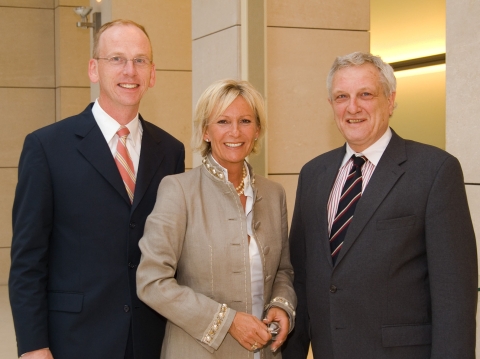
Jury member and Trustee Sabine Christiansen with the Arthur F. Burns Award Winner Markus Günther on the left and Kennan Award Winner Dr. Josef Joffe on the right.

Jury member and Trustee Sabine Christiansen with the Arthur F. Burns Award Winner Markus Günther on the left and Kennan Award Winner Dr. Josef Joffe on the right.
The award is usually given to one German and one American alumnus, but while many good stories were received from U.S. Burns alumni, none stood out as worthy of the 2006 prize.
In his story, Günther warned militarily powerful countries about the dangers of a quick military victory. Such victories, he wrote, lead to underestimating one’s opponent. Although we saw this in Vietnam, Günther explained that today’s ‘asymmetrical warfare’ far exceeds common guerilla tactics, but includes aspects of civil war, and can quickly lead to incalculable risks. The expected quick end to war is out of reach, and a military victory becomes impossible. The war’s goals remain unattainable.
While Günther based his article on fairly recent confrontations in Iraq, Afghanistan and Lebanon, his story reflects the European experience that ultimately led to the European Union. The current transatlantic debate focuses primarily on questions of military superiority. Günther’s story helps shift the terms of the debate through a European lens.
The 1,000-Euro George F. Kennan Commentary Award went to Dr. Josef Joffe, editor and publisher of Die Zeit, for his column “Nach dem Fiasko (After the Fiasco),” published in Zeit on March 9, 2006.
Dr. Joffe’s commentary piece impressed the jurors with its vivid language and extensive analysis of the power shift in the Middle East as a result of the Iraq war. Joffe views Iran as the unintentional winner of the “American fiasco.” In addition, he explores various issues including Germany’s role in nuclear policies with India, which undermine the nuclear non-proliferation treaty. Joffe’s analysis offers an expert lesson in the connections and correlations of world politics.
The jury for both awards was comprised of journalists Sabine Christiansen (ARD), Dr. Christoph von Marschall (Tagesspiegel), Claus Strunz (Bild am Sonntag), Florian Illies (Monopol) and Dominik Wichmann (Süddeutsche Zeitung), as well as Dr. Frank-Dieter Freiling (ZDF) and Nikolaus Graf Lambsdorff (Foreign Ministry of Germany).
2005 Burns Award Winners
2004 Burns Award Winners
2003 Burns Award Winners
2002 Burns Award Winners